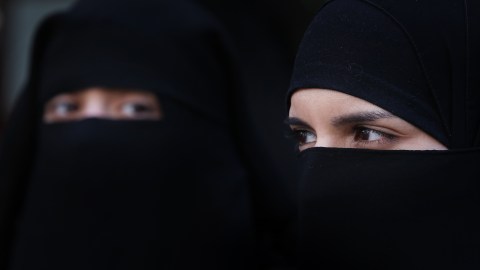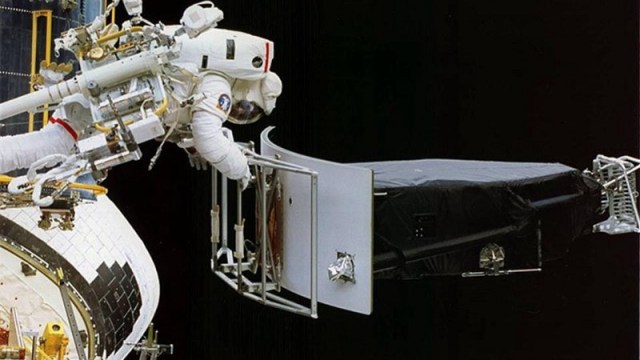Canadian Province Bans Face-Covering Garb in Public

To Americans, freedom of religion is sacrosanct. In other cultures, religion and the accoutrements that accompany it, are often looked at from a different perspective. In France for instance in 2011, the niqab or Muslim facial covering was banned in public spaces. This garment covers everything except the area around the eyes. The law bans facial covering anywhere in public, besides cars and places of worship. This was the first such ban in Europe.
Many French saw it as liberating these women from such a garment and securing the secularity of their society. The so-called French “burqa ban” was upheld by the European Court in 2014. Such laws have their limits in “the hexagon,” however. A French court suspended a ban put in place by several seaside communities on so-called “burkini’s. This came as a result of large, widely covered protests, sparked by an incident where police in Nice forced a Muslim woman to remove some of her clothing, while on the beach. Despite this brief conflagration, other countries have followed France’s lead.
In the Netherlands, facial coverings are banned on public transportation, but not from public view, unless it interferes with security. Meanwhile, Belgium has a blanket ban much like France’s, as do parts of Switzerland. Last January, Austria instituted a face covering ban in courts and schools. In America, a bill was proposed in the Georgia legislature but was withdrawn last year. It would have banned the burqa and niqab while driving or in one’s driver’s license photo.
Canadians, particularly Quebecois, have always gazed back to Europe. It seems the Francophiles are now taking a particular cue from their progenitors. The province has banned the niqab, burqa, and other face coverings in places where government services are delivered. That means public transportation, schools, hospitals, and municipal buildings. Teachers, doctors, nurses, and even daycare workers will also be barred from wearing anything that obscures the face.

New Quebec law bans facial coverings when giving or receiving government services. Credit: Getty Images.
Bill 62, which was tabled two years ago, was resurrected recently. It passed through Quebec’s National Assembly last Wednesday. So how will it be enforced?
According to Quebec Justice Minister Stéphanie Vallée, “As long as the service is being rendered, the face should be uncovered.” It effectively makes the state neutral in religious matters and helps facilitate communication, she said. It also aids in security via quicker identification. Critics however argue that it targets Muslim women unnecessarily and increases intolerance and derision in society.
The Premier of Quebec Philippe Couillard defended the law. “We are in a free and democratic society,” he said. “You speak to me, I should see your face, and you should see mine. It’s as simple as that.” His liberal party approved the law. They currently hold a majority in the province’s National Assembly.
There is an exception written into the law. One may make a “serious request” on religious grounds for an exemption. But these are not very well defined, critics argue. Few if any procedural points have been elucidated. Examples given are providing religious instruction or care, say in a hospital setting. Those wearing masks for occupational reasons such as working with hazardous materials, will still be allowed to use them.

Muslim women aren’t be the only ones effected. Credit: Getty Images.
So how much of the Quebec population will this ban impact? A 2016 study found that only 3% of Muslim women in the province wear such a garment. Ihsaan Gardee of the National Council of Canadian Muslims told The Guardian, “It seems like a made-up solution to an invented problem.” He continued, “We don’t have a big issue right now with hordes of Muslim women in niqab trying to work in the public service or accessing public services with difficulty.” His organization called it a case of “ugly identity politics.”
Gardee went on, “We can’t divorce this bill from the larger context in which it falls. According to Statistics Canada, hate crimes targeting Canadian Muslims increased from 2012 to 2015 by 253%.”Other Muslim leaders say the law stigmatizes those who choose to wear these garments. Canadian Prime Minister Justin Trudeau said that while the federal government doesn’t interfere with provincial law, all Canadian citizens must be respected.
It isn’t only veiled Muslim women but masked protestors who would be in violation of the law. In fact, the words niqab and burka don’t appear anywhere in the law’s text. Legal experts say advocacy groups are raising a legal challenge which is likely to worm its way through the courts. During the proceedings, Canada’s Charter of Rights and Freedoms and Quebec’s equivalent will likely be invoked.
To see an interesting debate regarding a similar law in the UK, watch this:





